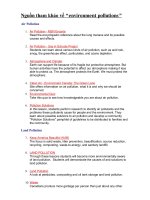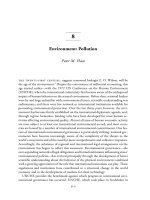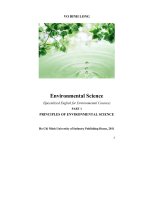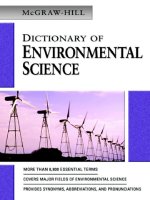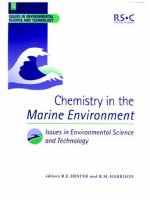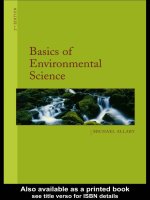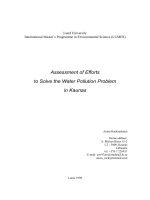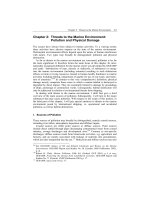Environmental Science: Environment pollution
Bạn đang xem bản rút gọn của tài liệu. Xem và tải ngay bản đầy đủ của tài liệu tại đây (279.59 KB, 13 trang )
Environmental Pollution
1
Environmental Pollution
Pollution is the harmful
alteration of our
environment.
Pollutants – either
unwanted by-products or
our activities or the
obnoxious residues of
things we have made,
used, and thrown away.
Air Pollution
Water Pollution
Soil Pollution
Global Warming
Noise Pollution
Sources of Pollution
3
Types of Pollution
Air pollution
– Most air pollution is caused by the burning of fossil
fuels.
Water pollution
–
–
–
–
–
–
–
–
Organic sewage
Eutrophication
Infectious agents
Organic chemicals
Inorganic and miscellaneous chemicals
Sediments from land corrosion
Radioactive substances
Waste heat from power plants and industry
Types of Pollution—Continued
Soil pollution
– Pesticides – chemicals used to kill insects defined
as pests.
– Herbicides – chemicals used to kill plant life,
particularly weeds.
– Chemical wastes
– Radioactive fallout
– Acid rain
– Garbage
Global warming
– Since the late 1800’s the average global surface
temperature has increased about 0.75 degrees C.
– Most warming has occurred since 1950.
Environmental Depletion
The Dwindling Natural Resources
– No nation is self-sufficient in the modern
world.
Energy Production and Consumption
– Energy consumption per capita is higher
in the United States than it is in any
other country in the world.
– Consumption is growing more rapidly
than production.
Environmental Depletion
Over the course of human history, nearly half
of the earth’s forests have been depleted,
most of which has occurred since 1970.
Energy use per capita is increasing in most of
the developing nations.
In 1970, Americans drove their cars, vans,
pickups, and SUVs 1.043 trillion miles; by
2004, the number rose to 2.72 trillion miles.
The Physical Threat
Air pollution can cause or contribute to:
–
–
–
–
–
–
–
–
–
Permanent lung damage in children
Fetal deaths
Infant mortality
Respiratory illness
Cardiovascular disease
Skin problems, ulcers, and liver and kidney damage
Premature deaths
Asthma attacks
Lung cancer
Exposure to toxic materials can also lead to sterility
The depleted ozone layer raises the risk of skin
cancer
Threat to the Ecological Balance
The lust for more affluence and unrestrained
population growth are ravaging the environment –
Paul Ehrlich.
A number of species of animals and plants have
disappeared.
People depend on biological diversity for the quality
of their lives.
Photosynthesis – a natural process essential to life,
resulting in the production of oxygen and organic
materials.
Urbanization – the increasing concentration of
people living in cities.
Other Problems
The Economic Costs
– Damage to livestock, trees, and crops
– Death of wildlife
– Expense of pollution-control measures
– Cost of medical care for those whose health is affected
– Lost work time due to ill health
– Expense of maintaining and refurbishing buildings and
other structures that deteriorated because of pollution
– Cost of restoring the quality of the air and of
waterways.
Threat to World Peace
Social Structural Factors
Population Growth
– Population growth accelerates the consumption
of earth’s natural resources.
– Any given area on earth has a limited carrying
capacity.
– Threshold effect
The Industrial Economy
– The U.S. with about 4.6% of the world’s
population, accounts for 22% of the world’s
carbon dioxide emissions.
– More than ¼ of all cars in the world are on U.S.
roads.
The Politics of the Environment
Social Psychological Factors
Attitudes and the Environment
– Many people see the earth as a resource to be
mined rather than as a trust to be cared for.
– 42% of Americans believe the government was
doing about the right amount or too much to
protect the environment.
Values and the Environment
– Quantitative colossalism
– Individualism
Types of Pollution
Water
Pollution
Air Pollution
Soil Pollution
Noise Pollution
13

